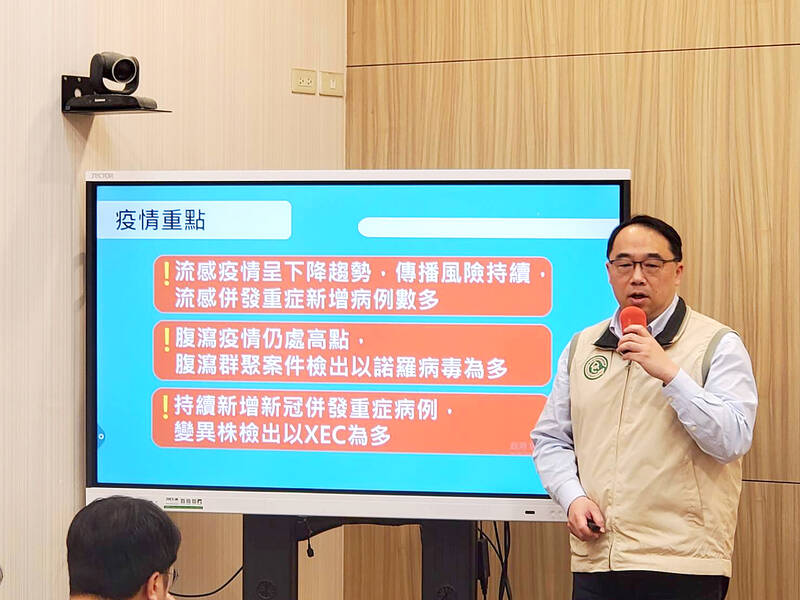Hospital visits for flu-like illness dropped about 9 percent last week from a week earlier, although the risk of serious flu complications remains high and there are only about 20,000 doses of public-funded flu vaccines remaining, the Centers for Disease Control (CDC) said yesterday.
CDC Deputy Director-General Tseng Shu-hui (曾淑慧) said 137,042 hospital visits for flu-like illness were reported last week, down 9 percent weekly, but still the highest for the same week in five years and the second-highest in a decade.
Data for the past four weeks showed that influenza viruses were the main respiratory pathogen circulating in local communities, with influenza A(H1N1) the dominant strain, CDC Epidemic Intelligence Center Director Guo Hung-wei (郭宏偉) said.

Photo: Lin Hui-chin, Taipei Times
Eighty-three cases of severe flu complications and 23 flu-related deaths were reported last week, Guo said.
In this flu season, which began on Oct. 1 last year, there had been 999 severe cases, including 204 deaths, he said.
A girl aged under two died last week, the youngest flu-related death this flu season, CDC physician Lin Yung-ching (林詠青) said.
She died on the fourth day after being hospitalized, Lin said.
The girl did not have a congenital disease and was vaccinated against the flu last year, he said.
She developed cold-like symptoms in the middle of this month and was diagnosed with influenza A, he said.
She developed a fever of 42°C and had other symptoms, including shortness of breath and altered consciousness, Lin said, adding that she was rushed to a hospital, where she was suspected to have acute necrotizing encephalopathy.
She died of flu-associated encephalopathy, septic shock and multiple organ failure, he said.
Flu activity in Taiwan is slowing, but has not dropped below the epidemic threshold and the risk of severe illness remains relatively high, so people at a higher risk of developing severe complications from infection are strongly encouraged to get vaccinated, Tseng said.
Since 100,000 additional doses of government-funded flu vaccines became available for high-risk groups on Thursday last week, more than 70,000 doses had been administered as of yesterday, she said.
The remaining doses are available at 1,070 contracted healthcare facilities across the country, with eligibility criteria on the CDC’s Web site (http://gov.tw/vkb), she said.
People should book an appointment to get vaccinated, she added.
Meanwhile, there were 304,418 hospital visits for diarrhea last week, 5.1 percent higher than the previous week and the highest for the week in five years, Tseng said.
Fourteen people were hospitalized with COVID-19 and one person died from the disease last week, Guo said, adding that none of them had received the latest JN.1-adapted vaccine.
The XEC subvariant, a recombinant SARS-CoV-2 variant derived from the JN.1 descendant lineages, is now the dominant strain of SARS-CoV-2 circulating locally and globally, Tseng said.
COVID-19 infection can still pose serious health risks, especially among elderly people and those with underlying health conditions, and studies show that vaccines can reduce the risk of severe illness or death, she said.
The JN.1-adapted vaccines can still provide protection against the XEC subvariant, so people who are eligible for the vaccine are recommended to get it, she said.

Taiwan is stepping up plans to create self-sufficient supply chains for combat drones and increase foreign orders from the US to counter China’s numerical superiority, a defense official said on Saturday. Commenting on condition of anonymity, the official said the nation’s armed forces are in agreement with US Admiral Samuel Paparo’s assessment that Taiwan’s military must be prepared to turn the nation’s waters into a “hellscape” for the Chinese People’s Liberation Army (PLA). Paparo, the commander of the US Indo-Pacific Command, reiterated the concept during a Congressional hearing in Washington on Wednesday. He first coined the term in a security conference last

Prosecutors today declined to say who was questioned regarding alleged forgery on petitions to recall Democratic Progressive Party (DPP) legislators, after Chinese-language media earlier reported that members of the Chinese Nationalist Party (KMT) Youth League were brought in for questioning. The Ministry of Justice Investigation Bureau confirmed that two people had been questioned, but did not disclose any further information about the ongoing investigation. KMT Youth League members Lee Hsiao-liang (李孝亮) and Liu Szu-yin (劉思吟) — who are leading the effort to recall DPP caucus chief executive Rosalia Wu (吳思瑤) and Legislator Wu Pei-yi (吳沛憶) — both posted on Facebook saying: “I

The Ministry of Economic Affairs has fined Taobao NT$1.2 million (US$36,912) for advertisements that exceed its approved business scope, requiring the Chinese e-commerce platform to make corrections in the first half of this year or its license may be revoked. Lawmakers have called for stricter enforcement of Chinese e-commerce platforms and measures to prevent China from laundering its goods through Taiwan in response to US President Donald Trump’s heavy tariffs on China. The Legislative Yuan’s Finance Committee met today to discuss policies to prevent China from dumping goods in Taiwan, inviting government agencies to report. Democratic Progressive Party Legislator Kuo Kuo-wen (郭國文) said

The Ministry of Economic Affairs has fined Taobao NT$1.2 million (US$36,900) for advertisements that exceeded its approved business scope and ordered the Chinese e-commerce platform to make corrections in the first half of this year or its license would be revoked. Lawmakers have called for stricter supervision of Chinese e-commerce platforms and more stringent measures to prevent China from laundering its goods through Taiwan as US President Donald Trump’s administration cracks down on origin laundering. The legislature’s Finance Committee yesterday met to discuss policies to prevent China from dumping goods in Taiwan, inviting government agencies to report on the matter. Democratic Progressive Party